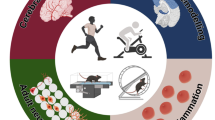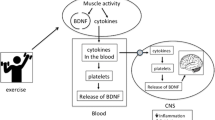Abstract
Exercise can have profound effects on numerous biologic systems within the human body, including the central nervous system (CNS). The inherent complexity of the CNS, and the methodologic difficulties in evaluating its in vivo neurochemistry in humans, provide challenges to investigators studying the impact of exercise on the CNS. As a result, our knowledge in this area of exercise science remains relatively limited. However, advances in research technology are allowing investigators to gain valuable insight into the neurobiologic mechanisms that contribute to the bidirectional communication that occurs between the periphery and the CNS during exercise. This article examines how exercise-induced alterations in the CNS contribute to central fatigue and the overtraining syndrome, and how exercise can influence psychologic wellbeing and cognitive function.
Similar content being viewed by others
References and Recommended Reading
Meeusen R, DeMeirlier K: Exercise and brain neurotransmission. Sports Med 1995, 20:160–188.
Groves PM, Rebec GV: Organization of the nervous system. In Introduction to Biological Psychology, edn 3. Dubuque: Wm. C. Brown Publishers; 1988:93.
Liu JZ, Dai TH, Sahgal V, et al.: Nonlinear cortical modulation of muscle fatigue: a functional MRI study. Brain Res 2002, 957:320–329.
Noakes TD: Physiological models to understand exercise fatigue and the adaptations that predict or enhance athletic performance. Scand J Med Sci Sports 2000, 10:123–145.
Davis JM, Bailey SP: Possible mechanisms of central nervous system fatigue during exercise. Med Sci Sports Exerc 1997, 29:45–57. excellent review of the scientific evidence regarding the role of the central nervous system in exercise-related fatigue.
Gandevia SC: Spinal and supraspinal factors in human muscle fatigue. Physiol Rev 2001, 81:1725–1789. A comprehensive review of the neural mechanisms that contribute to central fatigue.
Nybo L, Secher NH: Cerebral perturbations provoked by prolonged exercise. Prog Neurobiol 2004, 72:223–261. An outstanding review article that examines the cerebral metabolic and neurohumeral changes that occur with prolonged exercise, with a particular emphasis on how these alterations contribute to exerciserelated fatigue.
Bailey SP, Davis JM, Ahlborn EN: Neuroendocrine and substrate responses to altered brain 5-HT activity during prolonged exercise to fatigue. J Appl Physiol 1993, 74:3006–3012.
Nybo L, Nielsen B, Blomstrand, et al.: Neurohumeral responses during prolonged exercise in humans. J Appl Physiol 2003, 95:1125–1131.
Armstrong LE, Van Heest JL: The unknown mechanism of the overtraining syndrome: clues from depression and psychoneuroimmunology 2002, 32:185–209. An excellent review of several proposed mechanisms underlying the development of the OTS, with a special focus on the shared characteristics between this condition and major depression.
Conlay LA, Sabounjian LA, Wurtman RJ: Exercise and neuromodulators: choline and acetylcholine in marathon runners. Int J Sports Med 1992, 13:S141-S142.
Smith LL: Cytokine hypothesis of overtraining: a physiological adaptation to excessive stress? Med Sci Sports Exerc 2000, 32:317–331. This paper provides an interesting discussion of the cytokine hypothesis of OTS.
Pedersen BK, Ostrowski K, Bruunsgaard H: The cytokine response to strenuous exercise. Can J Physiol Pharmacol 1998, 76:505–511.
Robson PJ: Elucidating the unexplained underperformance syndrome in endurance athletes: the interleukin-6 hypothesis. Sports Med 2003, 33:771–781. This paper provides an interesting discussion of the cytokine hypothesis of OTS, with a focus on the role of IL-6.
Kurzrock R: The role of cytokines in cancer-related fatigue. Cancer 2001, 92:1684–1688.
Nishimoto N, Sasai M, Shima Y, et al.: Improvement in Castleman’s disease by humanized anti-interleukin-6 receptor. Blood 2000, 95:56–61.
Spath-Schwalbe E, Hansen K, Schmidt F, et al.: Acute effects of recombinant human interleukin-6 on endocrine and central nervous sleep functions in healthy men. J Clin Endocrinol Metab 1998, 83:1573–1579.
Nybo L, Nielsen B, Pedersen BK, et al.: Interleukin-6 release from the human brain during prolonged exercise. J Physiol 2002, 542:991–995.
Budgett R: Fatigue and underperformance in athletes: the overtraining syndrome. Br J Sports Med 1998, 32:107–110.
Uusitalo AL: Overtraining: making a difficult diagnosis and implementing targeted treatment. Phys Sports Med 2001, 29:35–40; 43–44; 49–50.
Lehman M, Foster C, Dickhuth HH, et al.: Autonomic imbalance hypothesis and overtraining syndrome. Med Sci Sports Exerc 1998, 30:1140–1145.
Gastman UA, Lehman MJ: Overtraining and the BCAA hypothesis. Med Sci Sports Exerc 1998, 30:1173–1178.
Fox KR: The influence of physical activity on mental wellbeing. Public Health Nutr 1999, 2:411–418.
Brosse AL, Sheets ES, Lett HS, et al.: Exercise and the treatment of clinical depression in adults: recent findings and future directions. Sports Med 2002, 32:741–760.
Meyer T, Broocks A: Therapeutic impact of exercise on psychiatric disease: guidelines for exercise testing and prescription. Sports Med 2000, 30:269–279.
Anal MN, Colt EW, Clark WC, et al.: Pain sensitivity, mood and plasma endocrine levels in man following long-distance running: effects of naloxone. Pain 1984, 19:13–25.
Paluska SA, Schwenk TL: Physical activity and mental health: current concepts. Sports Med 2000, 29:167–180.
Plante TG, Rodin J: Physical fitness and enhanced psychological health. Curr Psychol Res Rev 1990, 9:3–24.
Weyer S, Kupfer B: Physical exercise and psychological health. Sports Med 1994, 17:108–116.
Weuve J, Kang JH, Manson JE: Physical activity, including walking, and cognitive function in older women. JAMA 2004, 292:1454–1461. An important, large, prospective study of older women demonstrating that higher levels of long-term physical activity were strongly associated with better cognitive function and less cognitive decline.
Laurin D, Verreault R, Lindsay J, et al.: Physical activity and risk of cognitive impairment and dementia in elderly persons. Arch Neurol 2001, 58:498–504. important, large, prospective study demonstrating that physical activity was associated with reduced risk of cognitive impairment and dementia, particularly Alzheimer type, in an elderly population.
Barnes DE, Yaffe K, Satariano WA, et al.: A longitudinal study of cardiorespiratory fitness and cognitive function in healthy older adults. J Am Geriatr Soc 2003, 51:459–465.
Cotman CW, Berchtold NC: Exercise: a behavioral intervention to enhance brain health and plasticity. Trends Neurosci 2002, 25:295–301.
Colcombe S, Kramer AF: Fitness effects on the cognitive function of older adults: a meta-analytic study. Psychol Sci 2003, 14:125–130.
Author information
Authors and Affiliations
Rights and permissions
About this article
Cite this article
Anish, E.J. Exercise and its effects on the central nervous system. Curr Sports Med Rep 4, 18–23 (2005). https://doi.org/10.1007/s11932-005-0025-5
Published:
Issue Date:
DOI: https://doi.org/10.1007/s11932-005-0025-5




